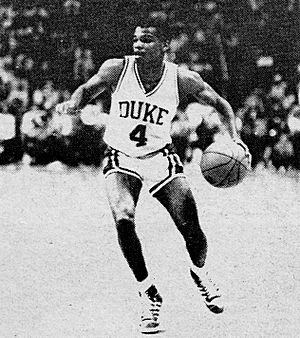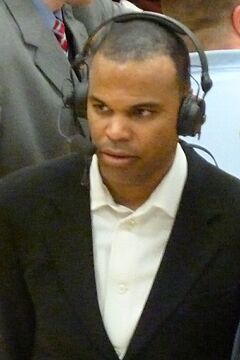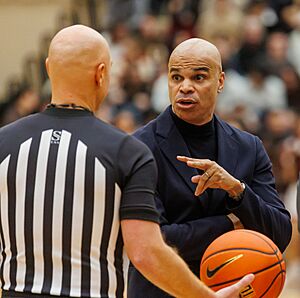Tommy Amaker facts for kids
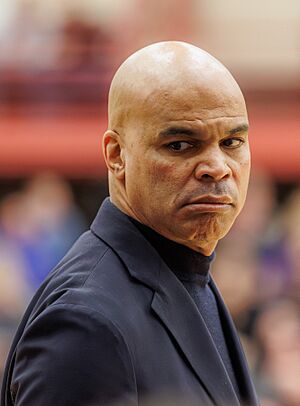
Amaker in 2024
|
||||||||||||||||||||
| Current position | ||||||||||||||||||||
|---|---|---|---|---|---|---|---|---|---|---|---|---|---|---|---|---|---|---|---|---|
| Title | Head coach | |||||||||||||||||||
| Team | Harvard | |||||||||||||||||||
| Conference | Ivy League | |||||||||||||||||||
| Record | 304–194 (.610) | |||||||||||||||||||
| Biographical details | ||||||||||||||||||||
| Born | June 6, 1965 Falls Church, Virginia, U.S. |
|||||||||||||||||||
| Playing career | ||||||||||||||||||||
| 1983–1987 | Duke | |||||||||||||||||||
| Position(s) | Point guard | |||||||||||||||||||
| Coaching career (HC unless noted) | ||||||||||||||||||||
| 1988–1997 | Duke (assistant) | |||||||||||||||||||
| 1997–2001 | Seton Hall | |||||||||||||||||||
| 2001–2007 | Michigan | |||||||||||||||||||
| 2007–present | Harvard | |||||||||||||||||||
| Head coaching record | ||||||||||||||||||||
| Overall | 480–333 (.590) | |||||||||||||||||||
| Tournaments | 4–5 (NCAA Division I) 11–8 (NIT) 0–1 (CIT) |
|||||||||||||||||||
| Accomplishments and honors | ||||||||||||||||||||
| Championships | ||||||||||||||||||||
| NIT (2004) 7 Ivy League Regular Season (2011–2015, 2018, 2019) |
||||||||||||||||||||
| Awards | ||||||||||||||||||||
|
||||||||||||||||||||
|
Medal record
|
||||||||||||||||||||
Harold Tommy Amaker Jr. (born June 6, 1965) is a well-known American college basketball coach. He is currently the head coach for the Harvard University men's basketball team. Before Harvard, he coached at the University of Michigan and Seton Hall University.
Amaker was also a talented player. He played point guard for Duke University. After his playing days, he became an assistant coach at Duke under Mike Krzyzewski. As a player, Amaker was recognized as an All-American and set many records.
As a coach, he led Seton Hall to postseason tournaments in all four of his seasons there. He helped Michigan win the National Invitation Tournament in 2004. At Harvard, he has achieved the school's highest single-season win totals. He also led Harvard to its first six Ivy League championships and its first NCAA tournament victory.
Contents
Early Life and High School
Tommy Amaker was born in Falls Church, Virginia in 1965. He went to W. T. Woodson High School from 1979 to 1983. His coach, Paul (Red) Jenkins, had noticed Amaker's talent since he was 10 years old.
Amaker was the first freshman to play varsity basketball at Woodson High. He led his team to four straight Northern District titles. He even helped them beat strong teams like DeMatha Catholic High School.
Amaker was a McDonald's All-American and a Parade All-American. In 1983, he won the Wooden Defensive Player of the Year award. This award went to the best high school defensive player in the country. He averaged nearly 18 points, 7.5 assists, and 3.5 steals per game in high school.
College Basketball Career
Amaker became a star point guard at Duke University. He started playing as a freshman for coach Krzyzewski. He led the team in assists for three years and in steals for all four seasons.
Playing at Duke
When Amaker joined the team in 1983, Duke started the season with seven straight wins. This was the longest winning streak for coach Krzyzewski at that time. Amaker helped Duke reach the NCAA Tournament in his freshman and sophomore years.
In his junior year (1985–86), Duke won the NIT Season Tip-Off tournament. Amaker had nine assists in the championship game. He also helped Duke win its first regular season ACC Championship since 1966.
Duke was ranked number one going into the 1986 NCAA tournament. Amaker and his teammate Johnny Dawkins were known for their strong defense. Duke made it to the championship game, setting a new NCAA record with 37 wins in a single season. They finished as national runner-up to Louisville.
Amaker set several Duke records for steals. He had 81 steals in 1986, which was a school record at the time. He also set a tournament record with 18 steals in the 1986 NCAA tournament. He was chosen for the 1986 NCAA Final Four team.
Senior Year and Awards
As a senior, Amaker was the team captain for the 1986–87 Duke team. He led Duke back to the 1987 NCAA tournament, where they reached the Sweet Sixteen.
In 1987, Amaker won the first-ever Henry Iba Corinthian Award. This award is also known as the NABC Defensive Player of the Year. He was also named to the 1987 NCAA Men's Basketball All-American third team. Amaker earned his college degree in economics from Duke in 1987.
Amaker set many Duke records for assists and games played. He held the record for single-season assists for a few years. He also held the record for most consecutive games started (138).
Professional Career
After college, Amaker was drafted by the Seattle SuperSonics in the 1987 NBA draft. He was also drafted by the Staten Island Stallions in the United States Basketball League. However, he was considered too small for the NBA. He decided to return to Duke to get his Master of Business Administration (MBA) degree.
Coaching Career
Assistant Coach at Duke
In 1988, Amaker became a graduate assistant on Coach Krzyzewski's staff at Duke. He was an assistant coach from 1989 to 1997. During this time, Duke won two NCAA Championships (1991 and 1992). They also made two other Final Four appearances. Duke won four regular season ACC championships during his time as an assistant.
Head Coach at Seton Hall
In 1997, Amaker became the head coach at Seton Hall. At 31, he was the youngest head basketball coach in Big East Conference history. He led Seton Hall to the NCAA tournament once (2000), reaching the "Sweet Sixteen." His team also played in the National Invitation Tournament three times (1998, 1999, and 2001).
In 1999–2000, Seton Hall had a great season, winning 22 games. They made it to the Sweet Sixteen in the NCAA tournament.
Head Coach at Michigan
Amaker became the head coach at Michigan in 2001. The team was dealing with some past issues, which meant they couldn't play in postseason tournaments for a couple of years.
Despite these challenges, Amaker's 2003–04 team won the 2004 National Invitation Tournament. This was his highest single-season victory total at that time, with 23 wins. In 2005–06, Michigan finished as the runner-up in the 2006 National Invitation Tournament.
Amaker was praised for helping to improve the team's reputation. However, some people felt he struggled to lead Michigan to the NCAA tournament. He left Michigan in 2007.
Head Coach at Harvard
On April 11, 2007, Amaker became the head men's basketball coach at Harvard University. Harvard's team had not had a winning season for five years before he arrived. Amaker was the only African American head coach among Harvard's 32 sports teams.
In his first year, Harvard beat his former team, Michigan. This was Harvard's first win ever against a major conference school. In 2009, his Harvard team defeated Boston College, which was a ranked team. This was the first time Harvard had beaten a ranked opponent.
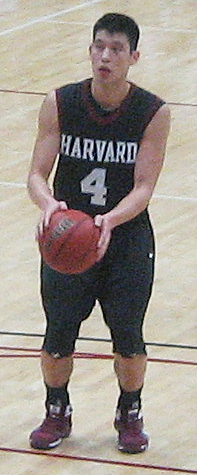
The 2009–10 Harvard team, led by senior Jeremy Lin, had their highest single-season win total ever (21 wins). They were invited to the 2010 CollegeInsider.com Tournament. Amaker was named the 2010 Ivy League Coach of the Year by Fox Sports.
In 2010, there were some questions about recruiting rules, and Harvard accepted some recruiting restrictions for the 2010–11 season.
Under Amaker, the 2010–11 team tied for the 2010–11 Ivy League men's basketball season championship. This was Harvard's first men's basketball Ivy League championship since the league started. They set a school record with 23 wins. Harvard also made its first appearance in the National Invitation Tournament.
The 2011–12 Harvard team defeated Florida State, a ranked team. This was Harvard's highest-ranked opponent defeated at that point. In December 2011, Harvard appeared in the national polls (AP Poll and Coaches' Poll) for the first time ever. The team set a new record with 26 wins. In March 2012, Harvard earned its first bid to the NCAA tournament since 1946.
The 2012–13 Harvard team faced challenges when two key players withdrew from the team. Despite this, they won the 2013 Ivy League championship again. On March 21, 2013, Harvard won its first-ever NCAA tournament game, beating New Mexico.
The 2013–14 team won the 2013 Great Alaska Shootout and the Ivy League championship. They set a school record with 27 wins. They won another game in the 2014 NCAA Division I men's basketball tournament. This made them the first Ivy League school to win games in back-to-back NCAA tournaments since 1984.
On December 7, 2016, Amaker earned his 179th win with Harvard. This made him Harvard's all-time winningest coach, passing Frank Sullivan. He led Harvard to more Ivy League titles in 2018 and 2019.
Besides coaching, Amaker has also served as a Special Assistant to the Harvard University President. He was named a Champion of Diversity by the NCAA in 2021.
Personal Life
Tommy Amaker is married to Stephanie Pinder-Amaker, who is a clinical psychologist. They met when they were both at Duke. Amaker's mother used to send him his favorite spaghetti sauce by mail!
Amaker is known for his unique style, often wearing mock turtleneck shirts with his initials. He also tends to avoid the press and doesn't do many radio or TV shows.
In 2001, Amaker was inducted into the Duke Athletic Hall of Fame. He was also a member of the board of directors for USA Basketball. He helped choose players for the United States 1996 Olympic gold medal team.
Coaching Records
| Season | Team | Overall | Conference | Standing | Postseason | ||||
|---|---|---|---|---|---|---|---|---|---|
| Seton Hall Pirates (Big East Conference) (1997–2001) | |||||||||
| 1997–98 | Seton Hall | 15–15 | 9–9 | 3rd (BE 7) | NIT First Round | ||||
| 1998–99 | Seton Hall | 15–15 | 8–10 | T–8th | NIT First Round | ||||
| 1999–00 | Seton Hall | 22–10 | 10–6 | T–4th | NCAA Division I Sweet 16 | ||||
| 2000–01 | Seton Hall | 16–15 | 5–11 | 6th (West) | NIT First Round | ||||
| Seton Hall: | 68–55 (.553) | 32–36 (.471) | |||||||
| Michigan Wolverines (Big Ten Conference) (2001–2007) | |||||||||
| 2001–02 | Michigan | 11–18 | 5–11 | T–8th | |||||
| 2002–03 | Michigan | 18–12 | 10–6 | T–3rd | |||||
| 2003–04 | Michigan | 23–11 | 8–8 | T–5th | NIT Champion | ||||
| 2004–05 | Michigan | 13–18 | 4–12 | 9th | |||||
| 2005–06 | Michigan | 22–11 | 8–8 | T–6th | NIT Runner-Up | ||||
| 2006–07 | Michigan | 22–13 | 8–8 | T–7th | NIT Second Round | ||||
| Michigan: | 109–83 (.568) | 43–53 (.448) | |||||||
| Harvard Crimson (Ivy League) (2007–present) | |||||||||
| 2007–08 | Harvard | 8–22 | 3–11 | T–6th | |||||
| 2008–09 | Harvard | 14–14 | 6–8 | T–6th | |||||
| 2009–10 | Harvard | 21–7 | 10–4 | 3rd | CIT First Round | ||||
| 2010–11 | Harvard | 23–7 | 12–2 | T–1st | NIT First Round | ||||
| 2011–12 | Harvard | 26–5 | 12–2 | 1st | NCAA Division I Round of 64 | ||||
| 2012–13 | Harvard | 20–10 | 11–3 | 1st | NCAA Division I Round of 32 | ||||
| 2013–14 | Harvard | 27–5 | 13–1 | 1st | NCAA Division I Round of 32 | ||||
| 2014–15 | Harvard | 22–8 | 11–3 | T–1st | NCAA Division I Round of 64 | ||||
| 2015–16 | Harvard | 14–16 | 6–8 | 4th | |||||
| 2016–17 | Harvard | 18–10 | 10–4 | 2nd | |||||
| 2017–18 | Harvard | 18–14 | 12–2 | T–1st | NIT First Round | ||||
| 2018–19 | Harvard | 19–12 | 10–4 | T–1st | NIT Second Round | ||||
| 2019–20 | Harvard | 20–7 | 10–4 | 2nd | |||||
| 2020–21 | Harvard | ||||||||
| 2021–22 | Harvard | 13–13 | 5–9 | T–6th | |||||
| 2022–23 | Harvard | 14–14 | 5–9 | 7th | |||||
| 2023–24 | Harvard | 14–13 | 5–9 | 5th | |||||
| 2024–25 | Harvard | 12–15 | 7–7 | 5th | |||||
| Harvard: | 304–194 (.610) | 148–90 (.622) | |||||||
| Total: | 480–333 (.590) | ||||||||
|
National champion Conference regular season champion Conference tournament champion |
|||||||||
See also
 In Spanish: Tommy Amaker para niños
In Spanish: Tommy Amaker para niños
 | James Van Der Zee |
 | Alma Thomas |
 | Ellis Wilson |
 | Margaret Taylor-Burroughs |


